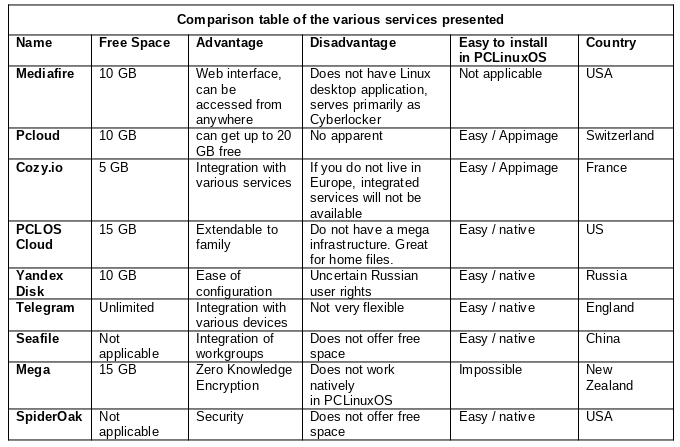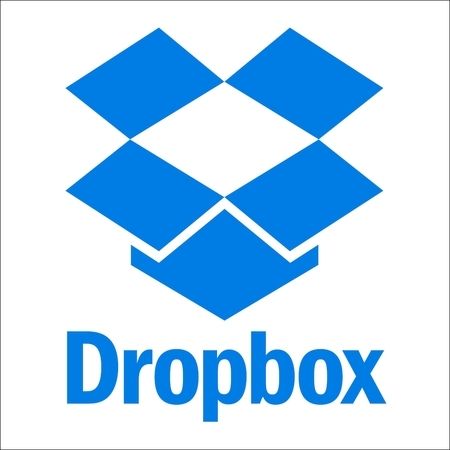| Previous
Page |
PCLinuxOS
Magazine |
PCLinuxOS |
Article List |
Disclaimer |
Next Page |
Alternatives To Dropbox: The Conclusion |
|
by Alessandro Ebersol (Agent Smith)
Over the past three months, I've been reviewing several alternatives to Dropbox that can be used in PCLinuxOS. The alternatives to Dropbox reviewed were:
Now, I will recap the biggest advantages and disadvantages of each one of the services, in order to analyze all the options and make a comparative table, to assist in choosing if you want to change from Dropbox to some other cloud storage service.
Mediafire
pCloud This service is versatile enough to exchange files with all your devices, be it cell phones, tablets or computers. It has native application for all major operating systems, both desktop and mobile. You can swap files even between machines with different operating systems. Because its client program comes in Appimage format, it works naturally on PCLinuxOS, as if it were native to the platform. It is a great option to replace Dropbox, and it is recommended.
Cozy.io Regarding the free space offered, it is one of the smallest of the bunch, 5GB, and it is not very recommended if you do not live in one of the European Union countries, where the company has its headquarters and its trading partners. It can be used without fear in PCLinuxOS, because its client application comes in Appimage format.
PCLOS Cloud With an attractive offer of 15 GB free, native client program in PCLOS repositories (which makes it very easy to install), it is a highly recommended service. The downside would be that the infrastructure is not gigantic, with multiple servers and data centers around the world, but if you do not need mission-critical services, with 100% availability, 24/7, 365, it may be a very attractive option.
Yandex Disk As a minus, the location of servers in Russia can lead to frustrating speeds, depending on where you live. Nor can we forget that issues of political and legal nature (definitions of user rights in Russia, which today have no clear legislation on the subject), and a possible fragility of cyber attacks may be factors that detract from the experience, and can frighten away potential users.
Telegram As the Telegram client is open source, it works great in PCLinuxOS, having clients in the repositories.
Seafile
Mega Kim tried to rebuild his company, but to no avail. Today's Mega no longer has Kim's participation, and when he can, he always speaks badly about the company now. Controlled by a Chinese investor, which is sought after by Chinese authorities, Mega today is a mere shadow of the company that it was in its heydays. Add to this a Linux client that does not work on PCLinuxOS, a web client that has download quotas and you have a beautiful turkey. Not recommended, in no way.
SpiderOak Although it does not have free plans, the service allows a free trial time, so that the user can try out if SpiderOak meets their needs. With native client for PCLinuxOS, it is also a good option if you value the privacy and availability of your data.  To keep things in perspective, Dropbox IS in the PCLinuxOS repository. Recent changes with Dropbox make it ONLY available to those who use the ext4 file system on Linux systems. Users of other file systems are ... well ... out of luck. Nearly every other service that offers free storage space offers significantly more storage space than Dropbox's paltry 2GB, which hasn't been expanded since Dropbox came about. Dropbox does offer the ability to purchase more storage, but the price can be a bit steep. So, as we come to the end of this series of articles. I hope you enjoyed it, and you find it useful, especially if you want to subscribe to another service and leave Dropbox. Or, even if you do not leave Dropbox, you now can have an alternative backup service. |


